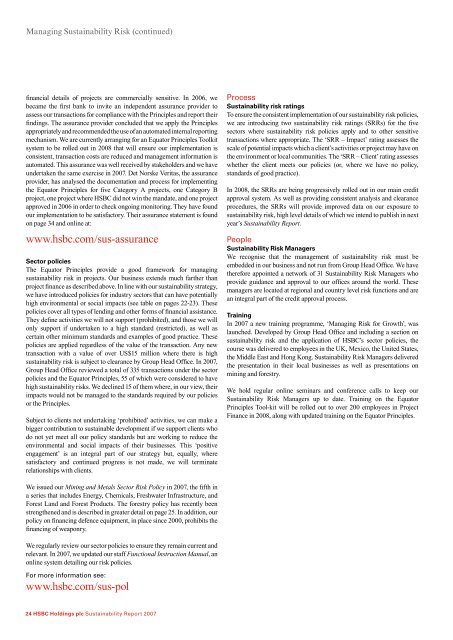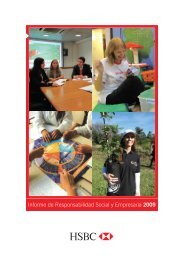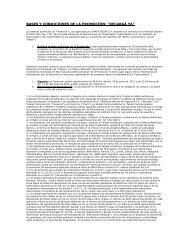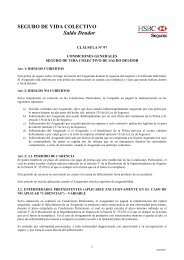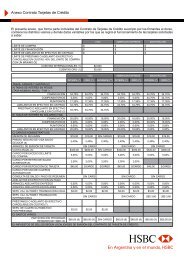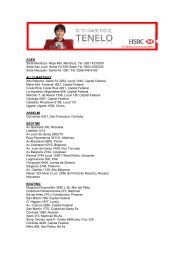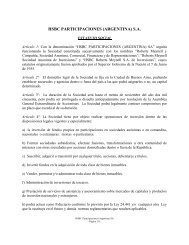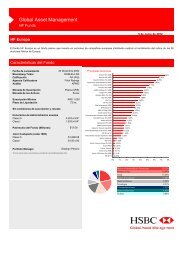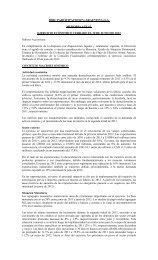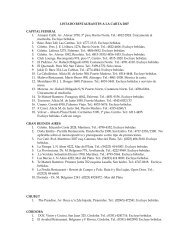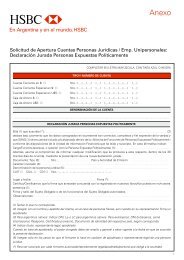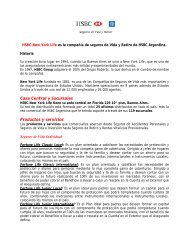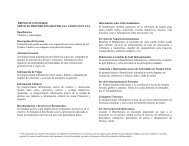HSBC Holdings plc Sustainability Report 2007
HSBC Holdings plc Sustainability Report 2007
HSBC Holdings plc Sustainability Report 2007
Create successful ePaper yourself
Turn your PDF publications into a flip-book with our unique Google optimized e-Paper software.
Managing <strong>Sustainability</strong> Risk (continued)<br />
financial details of projects are commercially sensitive. In 2006, we<br />
became the first bank to invite an independent assurance provider to<br />
assess our transactions for compliance with the Principles and report their<br />
findings. The assurance provider concluded that we apply the Principles<br />
appropriately and recommended the use of an automated internal reporting<br />
mechanism. We are currently arranging for an Equator Principles Toolkit<br />
system to be rolled out in 2008 that will ensure our implementation is<br />
consistent, transaction costs are reduced and management information is<br />
automated. This assurance was well received by stakeholders and we have<br />
undertaken the same exercise in <strong>2007</strong>. Det Norske Veritas, the assurance<br />
provider, has analysed the documentation and process for implementing<br />
the Equator Principles for five Category A projects, one Category B<br />
project, one project where <strong>HSBC</strong> did not win the mandate, and one project<br />
approved in 2006 in order to check ongoing monitoring. They have found<br />
our implementation to be satisfactory. Their assurance statement is found<br />
on page 34 and online at:<br />
www.hsbc.com/sus-assurance<br />
Sector policies<br />
The Equator Principles provide a good framework for managing<br />
sustainability risk in projects. Our business extends much farther than<br />
project finance as described above. In line with our sustainability strategy,<br />
we have introduced policies for industry sectors that can have potentially<br />
high environmental or social impacts (see table on pages 22-23). These<br />
policies cover all types of lending and other forms of financial assistance.<br />
They define activities we will not support (prohibited), and those we will<br />
only support if undertaken to a high standard (restricted), as well as<br />
certain other minimum standards and examples of good practice. These<br />
policies are applied regardless of the value of the transaction. Any new<br />
transaction with a value of over US$15 million where there is high<br />
sustainability risk is subject to clearance by Group Head Office. In <strong>2007</strong>,<br />
Group Head Office reviewed a total of 335 transactions under the sector<br />
policies and the Equator Principles, 55 of which were considered to have<br />
high sustainability risks. We declined 15 of them where, in our view, their<br />
impacts would not be managed to the standards required by our policies<br />
or the Principles.<br />
Subject to clients not undertaking ‘prohibited’ activities, we can make a<br />
bigger contribution to sustainable development if we support clients who<br />
do not yet meet all our policy standards but are working to reduce the<br />
environmental and social impacts of their businesses. This ‘positive<br />
engagement’ is an integral part of our strategy but, equally, where<br />
satisfactory and continued progress is not made, we will terminate<br />
relationships with clients.<br />
Process<br />
<strong>Sustainability</strong> risk ratings<br />
To ensure the consistent implementation of our sustainability risk policies,<br />
we are introducing two sustainability risk ratings (SRRs) for the five<br />
sectors where sustainability risk policies apply and to other sensitive<br />
transactions where appropriate. The ‘SRR – Impact’ rating assesses the<br />
scale of potential impacts which a client’s activities or project may have on<br />
the environment or local communities. The ‘SRR – Client’ rating assesses<br />
whether the client meets our policies (or, where we have no policy,<br />
standards of good practice).<br />
In 2008, the SRRs are being progressively rolled out in our main credit<br />
approval system. As well as providing consistent analysis and clearance<br />
procedures, the SRRs will provide improved data on our exposure to<br />
sustainability risk, high level details of which we intend to publish in next<br />
year’s <strong>Sustainability</strong> <strong>Report</strong>.<br />
People<br />
<strong>Sustainability</strong> Risk Managers<br />
We recognise that the management of sustainability risk must be<br />
embedded in our business and not run from Group Head Office. We have<br />
therefore appointed a network of 31 <strong>Sustainability</strong> Risk Managers who<br />
provide guidance and approval to our offices around the world. These<br />
managers are located at regional and country level risk functions and are<br />
an integral part of the credit approval process.<br />
Training<br />
In <strong>2007</strong> a new training programme, ‘Managing Risk for Growth’, was<br />
launched. Developed by Group Head Office and including a section on<br />
sustainability risk and the application of <strong>HSBC</strong>’s sector policies, the<br />
course was delivered to employees in the UK, Mexico, the United States,<br />
the Middle East and Hong Kong. <strong>Sustainability</strong> Risk Managers delivered<br />
the presentation in their local businesses as well as presentations on<br />
mining and forestry.<br />
We hold regular online seminars and conference calls to keep our<br />
<strong>Sustainability</strong> Risk Managers up to date. Training on the Equator<br />
Principles Tool-kit will be rolled out to over 200 employees in Project<br />
Finance in 2008, along with updated training on the Equator Principles.<br />
We issued our Mining and Metals Sector Risk Policy in <strong>2007</strong>, the fifth in<br />
a series that includes Energy, Chemicals, Freshwater Infrastructure, and<br />
Forest Land and Forest Products. The forestry policy has recently been<br />
strengthened and is described in greater detail on page 25. In addition, our<br />
policy on financing defence equipment, in place since 2000, prohibits the<br />
financing of weaponry.<br />
We regularly review our sector policies to ensure they remain current and<br />
relevant. In <strong>2007</strong>, we updated our staff Functional Instruction Manual, an<br />
online system detailing our risk policies.<br />
For more information see:<br />
www.hsbc.com/sus-pol<br />
24 <strong>HSBC</strong> <strong>Holdings</strong> <strong>plc</strong> <strong>Sustainability</strong> <strong>Report</strong> <strong>2007</strong>


